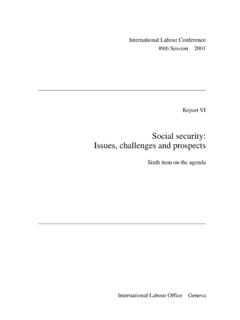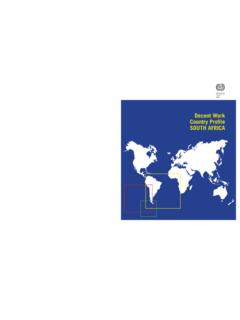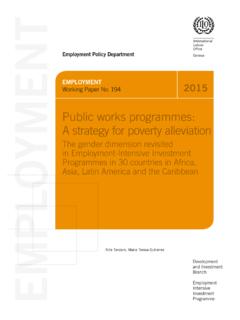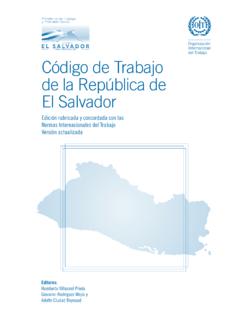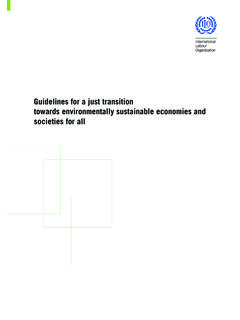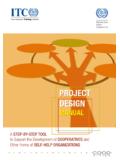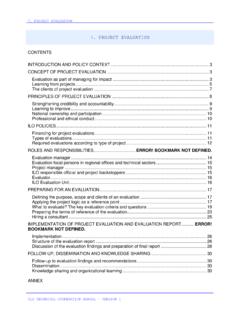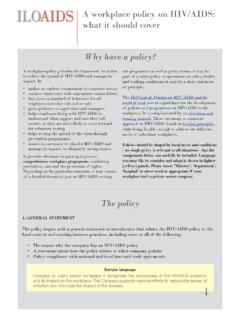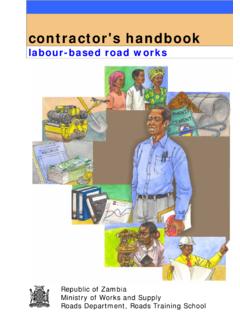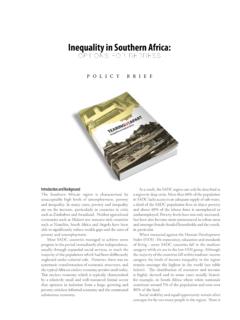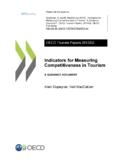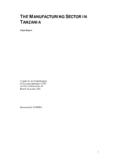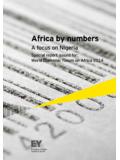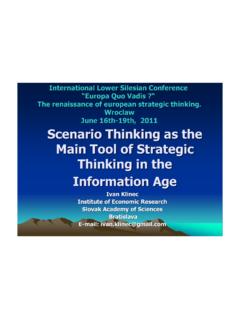Transcription of ASEAN Economic Community 2015: Enhancing …
1 Monika Aring February 2015 Regional Office for Asia and the Pacific ILO Asia-Pacific Working Paper Series ASEAN Economic Community 2015 : Enhancing competitiveness and employability through skill development ILO Asia-Pacific Working Paper Series ASEAN Economic Community 2015 : Enhancing competitiveness and employability through skill development Monika Aring February 2015 Regional Office for Asia and the Pacific Copyright International Labour Organization 2015 First published 2015 Publications of the International Labour Office enjoy copyright under Protocol 2 of the Universal Copyright Convention. Nevertheless, short excerpts from them may be reproduced without authorization, on condition that the source is indicated. For rights of reproduction or translation, application should be made to ILO Publications (Rights and Permissions), International Labour Office, CH-1211 Geneva 22, Switzerland, or by email: The International Labour Office welcomes such applications.
2 Libraries, institutions and other users registered with reproduction rights organizations may make copies in accordance with the licences issued to them for this purpose. Visit to find the reproduction rights organization in your country. Aring, Monika ASEAN Economic Community 2015 : Enhancing competitiveness and employability through skill development / Monika Aring ; ILO Regional Office for Asia and the Pacific. Bangkok : ILO, 2015 (ILO Asia-Pacific working paper series, ISSN: 2227-4405 (web pdf)) ILO Regional Office for Asia and the Pacific labour market / interindustry shift / skill requirements / competitiveness / employability / ASEAN countries ILO Cataloguing in Publication Data The designations employed in ILO publications, which are in conformity with United Nations practice, and the presentation of material therein do not imply the expression of any opinion whatsoever on the part of the International Labour Office concerning the legal status of any country, area or territory or of its authorities, or concerning the delimitation of its frontiers.
3 The responsibility for opinions expressed in signed articles, studies and other contributions rests solely with their authors, and publication does not constitute an endorsement by the International Labour Office of the opinions expressed in them. Reference to names of firms and commercial products and processes does not imply their endorsement by the International Labour Office, and any failure to mention a particular firm, commercial product or process is not a sign of disapproval. ILO publications and electronic products can be obtained through major booksellers or ILO local offices in many countries, or direct from ILO Publications, International Labour Office, CH-1211 Geneva 22, Switzerland, or ILO Regional Office for Asia and the Pacific, 11th Floor, United Nations Building, Rajdamnern Nok Avenue, Bangkok 10200, Thailand, or by email: Catalogues or lists of new publications are available free of charge from the above address, or by email: Visit our website: or Printed in Thailand Regional Office for Asia and the Pacific iii Preface By 2015 , the ASEAN Economic Community (AEC), envisioned as a single common market and production base, will become a reality.
4 This will lead to the freer flow of goods, services, investment capital and skilled labour in the region. Tariff and non-tariff barriers will be reduced, which will have implications for intraregional trade and investment. New opportunities for growth and prosperity are likely to emerge, but the challenge is to ensure that growth is inclusive and prosperity is shared. Ultimately, the success of ASEAN regional integration will depend on how it affects the labour market and therefore how it improves the quality of life of women and men in the region. To prepare for the impact and find the opportunities to seize, the International Labour Organization initiated with the Asian Development Bank a joint study to examine the impact of the AEC on labour. Findings from the series of studies that were initiated are collected in the 2014 publication ASEAN Community 2015 : Managing integration for better jobs and shared prosperity.
5 That report highlights the challenges and opportunities that will accompany the AEC, including managing labour migration, boosting productivity and wages and improving job quality. The report offers policy recommendations for creating better jobs and ensuring that the benefits of the AEC are equitably shared among different countries and sectors. The background papers to the joint publication are available as part of the ILO Asia Pacific Working Paper Series, which is intended to enhance the body of knowledge, stimulate discussion and encourage knowledge sharing and further research for the promotion of decent work in Asia and the Pacific. This paper by Monika Aring looks at which skills are needed in which countries and how countries can strengthen their skills and training systems to benefit from emerging opportunities of integration and thus boost their competitiveness in the AEC context.
6 The ILO is devoted to advancing opportunities for women and men to obtain decent and productive work. It aims to promote rights at work, encourage decent employment opportunities, enhance social protection and strengthen dialogue in handling work-related issues. As countries in the Asia and the Pacific region continue to recover from the global Economic crisis, the ILO s Decent Work Agenda and the Global Jobs Pact provide critical policy frameworks to strengthen the foundations for a more inclusive and sustainable future. Tomoko Nishimoto Assistant Director-General and Regional Director for Asia and the Pacific Regional Office for Asia and the Pacific v Contents 1..1 Structure of the A note on Definition of Brief overview of regional The importance of ongoing social dialogue with social partners Business, education, government and trade 2.
7 ASEAN s human resources: Quality and access to education and Literacy and education achievement across Skill mismatch, labour shortages and qualitative trends in employment and unemployment by skill 3. Overview of training and education institutions and policies in Overview of the training and education systems, institutions and policy frameworks in ASEAN countries (excluding TVET)..10 TVET challenges and policy School-to-work transition and gender 4. Structural transitions, emerging industries and new skills Regional initiatives to address the effects of structural Structural transitions and emerging skill Skill shifts in agriculture spotlight on Myanmar ..20 Skill shifts in manufacturing Spotlight on Cambodia s textile and garment Skill shifts in manufacturing spotlight on Thailand s automotive Skill shifts in services spotlight on the Skill shifts in food services for tourism spotlight on Skill shifts in information and communications technology Spotlight on the Shifts in the productivity and skills of small and medium-sized enterprises and what it might mean for women business owners in Implications for skills Shifts in the informal economy should provide opportunities for improving women s lives and those of vulnerable If social partners align their investments, Economic shifts could open new opportunities for improving the transition to work for 5.
8 Specific recommendations for CMLV Recommendations for the ASEAN -4 Recommendations for Brunei Darussalam and Regional Office for Asia and the Pacific vi Annex I. Country-specific education policy Annex II. Country-specific education challenges (non-TVET)..51 Annex III. Changes in occupations in ASEAN Member Annex IV. Specifications for TVET reform based on best practice Annex V. ASEAN countries Skills (Table) Comparing national qualifications frameworks in selected ASEAN (Figure) Distribution of youth employment in Cambodia, by actual hours worked per week and by sex (%) ..15 Regional Office for Asia and the Pacific vii Acknowledgements The author thanks Larry Hulbert for his invaluable assistance in helping to analyse massive amounts of data and the larger implications.
9 Thanks also to Lotte Mulder, Sophia Leung and Yolanda Ho for their assistance with editing and gathering the necessary statistical data. Thanks also to Phu Huynh, ILO Regional Office for Asia and the Pacific, for his invaluable suggestions on how to improve the first draft. Regional Office for Asia and the Pacific ix Abstract Given the varied development levels of countries with the Association of Southeast Asian Nations ( ASEAN ), this paper1 examines which skills are needed in which countries and how countries can strengthen their skills and training systems to benefit from emerging opportunities of integration and boost competitiveness . It also introduces the issues of skills certification, portability and recognition.
10 Maximizing the benefits of regional integration will necessitate leveraging the knowledge, skills and creativity of ASEAN s labour force of 317 million women and This paper looks at recent sex-disaggregated statistical indicators and trends since 2005 regarding education and skills attainment and technical and vocational education and training enrolment in ASEAN It assesses the quality of education and vocational training and the readiness of ASEAN s labour force, including young people making the school-to-work transition, to take advantage of new opportunities in a more integrated and dynamic The paper also examines the challenge of skills mismatch and skilled labour shortages in the ASEAN region by reviewing findings related to skills demand from recent enterprise surveys and quantitative trends in employment and unemployment by education and skill levels.
